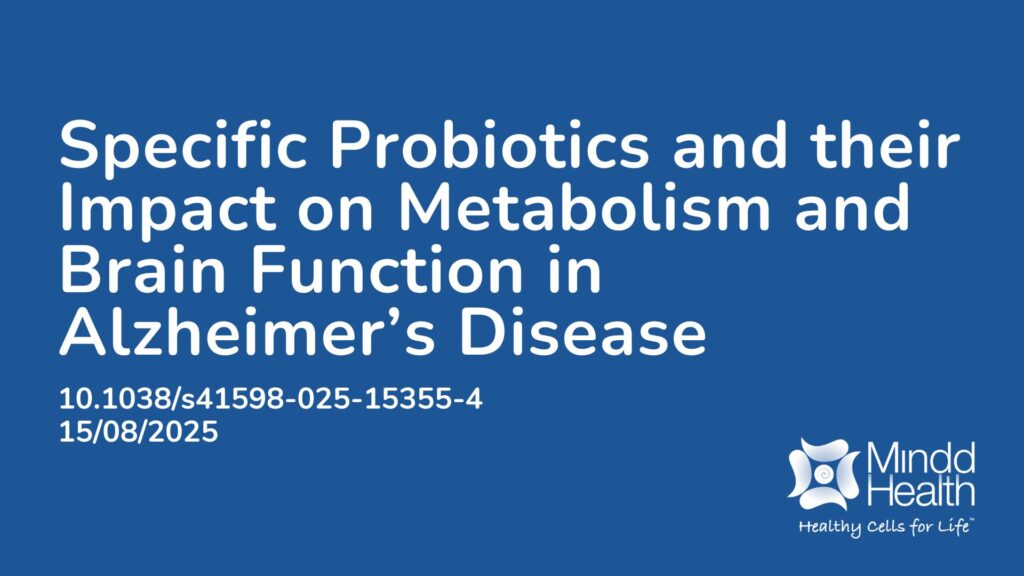Summary:
Alzheimer’s disease (AD) is a progressive neurodegenerative disorder characterised by amyloid-beta plaques, tau tangles, and cognitive decline. It is the most common form of dementia, affecting millions globally and imposing significant emotional and economic burdens. AD progression involves genetic, environmental, and metabolic factors, including disturbances in amino acid metabolism. Altered levels of branched-chain amino acids (BCAAs) and aromatic amino acids (AAAs) are linked to cognitive deficits, mitochondrial dysfunction, and impaired neurotransmitter synthesis. These amino acids are critical precursors for neurotransmitters such as serotonin, dopamine, norepinephrine, and GABA. Recent evidence highlights the gut-brain axis in AD, with probiotics emerging as potential modulators of metabolism and neuroprotection. Studies suggest certain probiotic strains may improve cognitive function, normalize tryptophan metabolism, and benefit neurotransmitter signaling. This study is a 12-week randomized, double-blind, placebo-controlled trial which examined the effects of L. rhamnosus HA-114 and B. longum R0175 on serum amino acid profiles in 60 adults with mild to moderate AD. Participants were assigned to one of three groups: L. rhamnosus (n=20), B. longum (n=20), or placebo (n=20). Results showed that B. longum significantly increased total amino acids, BCAAs, and AAAs compared to placebo, while L. rhamnosus significantly increased BCAAs. The largest improvements were observed in the B. longum group. These findings suggest that specific probiotic strains, particularly B. longum, can improve amino acid metabolism in AD, supporting their potential role in supporting the gut-brain axis and addressing metabolic disturbances in neurodegeneration.
Abstract:
Alzheimer’s disease (AD) is a neurodegenerative condition characterized by cognitive decline and associated metabolic disturbances, including altered amino acid profiles. This study investigated the effects of probiotic supplementation with Lactobacillus rhamnosus HA-114 and Bifidobacterium longum R0175 on serum amino acid levels in adults with mild to moderate AD. In a 12-week, randomized, double-blind, placebo-controlled trial, 60 participants (aged 50–90 years) were assigned to three groups: L. rhamnosus (n = 20), B. longum (n = 20), or placebo (n = 20). Serum amino acids were analyzed using High-Performance Liquid Chromatography (LC). Changes in total amino acids, Branched Chain Amino Acids (BCAAs), and aromatic amino acids (AAAs) were assessed as the primary outcomes. A significant interaction effect was found between time and group for serum amino acids. Compared to placebo, the B. longum group showed a significant increase in total amino acids (difference: 2132.67 µmol/L, 95% CI: 464.06–3801.28; p = 0.01), BCAAs (difference: 255.15 µmol/L, 95% CI: 53.01–457.30; p = 0.01), and AAAs (difference: 374.34 ng/ml, 95% CI: 57.45–691.23; p = 0.02). The L. rhamnosus group also showed a significant increase in BCAAs compared to placebo (difference: 206.08 µmol/L, 95% CI: 3.94–408.23; p = 0.04). The greatest improvements were consistently observed in the B. longum group across all primary outcome measures. Probiotic supplementation, particularly with B. longum, significantly improved serum amino acid profiles in patients with mild to moderate Alzheimer’s disease. These findings support the potential of specific probiotic strains to address metabolic imbalances in AD through gut-brain axis modulation.
Article Publication Date: 15/08/2025
DOI: 10.1038/s41598-025-15355-4



